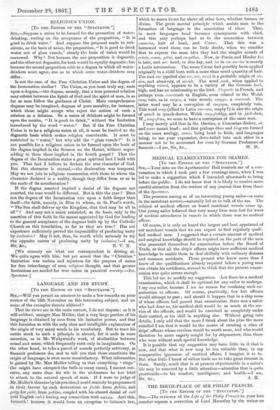MEDICAL EXAMINATIONS FOR SEAMEN.
[To THE EDITOR OF THE "SPECTATOR."]
Sin,—Your note on the Apothecaries' Hall reminds me of a con- versation in which I took part a few evenings since, when I was led to make a suggestion which I intended afterwards to bring before the public. I do not know that it is likely to receive more careful attention from the readers of any journal than from those of the Spectator.
The presence among us of an interesting young sailor—a mate in the merchant service—naturally led us to talk of the sea. The subject of medical officers on board merchant vessels came up. Our young sailor believed that very many lives were lost for want of medical attendance in vessels in which there was no medical officer.
Of course, it is only on board the largest and best appointed of our merchant vessels that we can expect to find regularly quali- fied medical men. I suggested that a certain amount of medical and surgical knowledge should be required on the part of the men who presented themselves for examination before the Board of Trade, so that all the ship's officers might have sufficient medical knowledge to enable them to deal skilfully with ordinary diseases and common accidents. Those present who knew more than I knew of the qualifications already required before a young man can obtain his certificate, seemed to think that the present exami- nation was quite severe enough.
This led me to modify my suggestion. Let there be a medical examination, which it shall be optional for any sailor to undergo. I say any sailor, because I see no reason for confining such ex- amination to officers. Of course, practically, few but officers would attempt to pass ; and should it happen that in a ship none of whose officers had passed that examination there was a sailor who had done so, his medical skill would be as much at the ser- vice of the officers, and would be exercised as completely under their control, as his skill in anything else. Without going into details, I only add that the more I think about the plan the more satisfied I am that it would be the means of creating a class of ships' officers whose services would be worth more, and who would therefore be more eagerly sought for by shipmasters, than those who were without such special knowledge.
It is possible that my suggestion may have little in it that is new, and that what is new may be less valuable than, in my comparative ignorance of nautical affairs, I imagine it to be. But what little I know of sailors leads me to take great interest in them. Surely, much that is at present objectionable in a sailor's life may be removed by a little attention—attention that is quite practicable—to his comfort, intelligence, and health.—I am, Sir, &c., A. R.






























 Previous page
Previous page